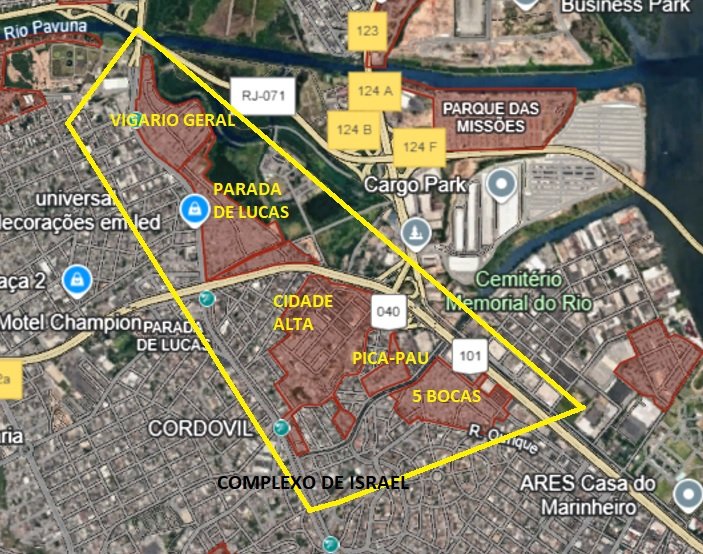Three people died and three others were injured during an intense shootout on Thursday morning (24) in the Complexo de Israel, in the North Zone. The confrontation between criminals and police blocked the city’s main expressway, Avenida Brasil, paralyzed public transportation services, such as BRTs and trains, and affected the daily lives of thousands of Rio residents.
This Content Is Only For Subscribers
To unlock this content, subscribe to INTERLIRA Reports.
Military Police Operation
The Military Police (PM) operation sought to arrest criminals involved in stealing cars and cargo. According to the PM, upon arriving at the Cinco Bocas, Pica Pau, and Cidade Alta communities, the agents faced strong resistance from the criminals. To prevent the PM from approaching, criminals set fire to several cars and barricades. Faced with the reaction and shots fired towards the road, the police decided to interrupt the operation and left the communities.
Complexo de Israel
The Complexo encompasses the communities of Vigário Geral, Parada de Lucas, Cinco Bocas, Pica-Pau, and Cidade Alta, in the North Zone of Rio de Janeiro. It is also surrounded by important roads, such as Avenida Brasil, Rodovia Washington Luiz, and Linha Vermelha. The main target of the operation, Álvaro Malaquias Santa Rosa, known as Peixão, 37, is the head of drug trafficking in the region. He is part of the Third Pure Command (TCP).
Military power
Drug traffickers’ military power also attracts the attention of the police. In May 2023, during an operation, civil police officers seized weapons worth an estimated R$1 million in the Parada de Lucas favela. These weapons can fire shots that pierce vehicle armor and can even bring down aircraft.
Autonomy
Despite being part of the TCP leadership, Peixão usually has autonomy to lead drug trafficking in the communities that he controls, without suffering interference from the criminal faction. In 2017, to escape a police siege after repelling an attempted invasion by a rival faction in Cidade Alta, Peixão was allegedly responsible for ordering the burning of vehicles to hinder the movement of patrol cars. At the time, nine buses were burned, and two trucks were set on fire on expressways such as Avenida Brasil, Linha Vermelha, and Rodovia Washington Luís.
Efficient Operations
Between 2007 and August 2024, Rio de Janeiro had 22,198 police operations. Of this total, only 316 (1.4%) were fully efficient, according to a survey by the Study Group on New Illegalities at the Fluminense Federal University (Geni-UFF). The efficiency indicator for police operations is divided into five categories: efficient (1.4%), reasonably efficient (14.4%), somewhat efficient (45.3%), inefficient (30%) and disastrous (8.9%). The operation carried out by the PM on the morning of this Thursday (24) in the Israel Complex, in the northern part of the capital, would be classified as disastrous.
Analysis:
The police operation in the Complexo de Israel highlights strategic and operational flaws that underscore significant challenges in confronting criminal organizations like the Third Pure Command (TCP). This incident exposes both inadequate management in public security actions and the growing complexity of drug trafficking in the city, particularly in densely populated areas with territorial control by organized crime.
The Military Police operation encountered heavy armed resistance. Police forces faced barricades and vehicles set on fire, frequently employing tactics by traffickers to hinder police advances. Given this scenario, the decision to halt the operation and retreat can be understood from the perspective of protecting both the officers and the public. However, it also suggests a lack of tactical and logistical preparation for dealing with areas where criminals possess heavy weaponry and deploy well-planned defense strategies.
The disruption of essential services, such as public transportation, and the closure of major expressways like Avenida Brasil directly affect the mobility and daily routines of residents. These blockages result in economic losses and heighten feelings of insecurity, particularly in areas near communities controlled by organized crime.




